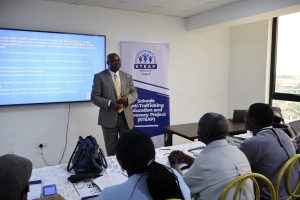NAPTIP, ICMPD urge media to champion ethical reporting in anti-human trafficking

Hajia Binta Bello, Director-General, National Agency for the Prohibition of Trafficking in Persons (NAPTIP), has urged journalists to uphold the highest ethical standards in reporting issues of human trafficking and migration.
Bello who said this in Benin at the opening of a two-day capacity-building workshop for media practitioners, told the participants that “with great power, comes great responsibility.”
The director general was represented by the Benin Zonal Commander of the agency.
The workshop was organised by NAPTIP in collaboration with the International Centre for Migration Policy Development (ICMPD) under the Schools Anti-Trafficking Education and Advocacy Project (STEAP).
According to the NAPTIP boss, the media’s role is more crucial now than ever in today’s rapidly evolving world.
“As journalists, you are the torchbearers of the truth; the defenders of human rights, and the architects of public discourse.
“Your reporting can influence opinions, shape policies, and shed light on the darkest corners of society.
“However, it is essential that we remain steadfast in adhering to ethical standards, particularly when addressing sensitive topics such as human trafficking,” she said.
Bello emphasised that ethical, survivor-centred reporting was critical to protecting victims’ dignity and ensuring that the fight against trafficking was not undermined by sensationalism or stigmatisation.
She pledged NAPTIP’s commitment to deepening partnerships with state and non-state actors.
“We shall continue to scale up our strategies to increase the interception and rescue of victims, improve partnerships and policy implementation, increase awareness, and ultimately ensure the prosecution of offenders,” she said.
On her part, Mrs Rhoda Dia-Johnson, STEAP Project Manager at ICMPD, said the training was designed to close the gaps in media practice that have, at times, weakened counter-trafficking efforts.
“Human trafficking and irregular migration remain pressing challenges in Nigeria, threatening the safety, dignity, and future of countless individuals.
“Yet, we have seen how sensationalism, misreporting, and stigmatisation of victims can undermine awareness campaigns, delay survivor recovery, and even weaken national and international counter-trafficking efforts,” she said.
Dia-Johnson explained that the workshop would build participants’ capacity in two areas.
The areas, she said, included ethical media reporting to ensure journalism was survivor-centred, trauma-informed, and rooted in human rights as well as monitoring, evaluation and learning (MEL) practices to enhance programme implementation and accountability.
“By the end of this workshop, we expect participants to leave with practical tools, stronger networks, and renewed commitment to ethical storytelling and evidence-driven programming,” she added
The workshop brought together journalists from Edo, Ogun, Delta, Enugu and Benue.
